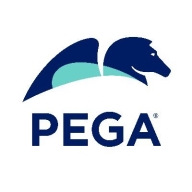

Pega Platform and Camunda are two prominent solutions in the business process management (BPM) space. Pega Platform shows strengths in enterprise-level capabilities, making it a leader in case management and integration services, while Camunda's open-source nature offers flexibility, especially in BPMN modeling and process automation.
Features: Pega Platform offers a robust case management system that excels in managing complex processes, supports a low-code development environment that accelerates application delivery, and integrates well with existing systems to enhance operational efficiency. Camunda provides flexibility through its open-source framework, offers superior support for BPMN modeling, and enables easy integration into diverse environments.
Room for Improvement: Pega would benefit from enhanced cloud capabilities, simplified integration processes, and improvements in AI functionalities. Camunda could improve by offering more user-friendly interfaces, better documentation for users, and a wider support network for integrating different programming languages.
Ease of Deployment and Customer Service: Pega's deployment can be complex due to architectural variations, but it is supported by a robust customer service infrastructure. However, response times and service quality can vary based on issue complexity. Camunda offers active community support and is compatible across multiple cloud platforms, although it lacks comprehensive enterprise-level support which could make advanced deployments more challenging.
Pricing and ROI: Pega Platform's pricing is relatively high and suits large enterprises aiming for substantial ROI through its advanced features. Camunda, being more cost-effective, especially in its open-source variant, provides scalability without heavy fees, appealing to mid-sized and large companies seeking cost-efficient solutions.
AWS provides the best support, followed by Microsoft, and then Google.
They provide better support for the enterprise edition.
The technical support from Pega is very low, rating a one or two out of ten.
I never needed support from the platform standpoint, but if additional features are required, we have regular meetings with the product team for feedback.
Pega's technical support team is very helpful.
Camunda offers a high level of scalability, especially when using its SaaS model, which manages and scales implementations automatically.
It allows for easy scaling, especially with ECS service configurations.
There haven't been any significant outages in my experience with Camunda.
More open documentation would be beneficial to understand the deployment process better and facilitate easier setup.
There is an issue where, in some situations, I need to scale up by observing both CPU and memory usage of containers, yet under the current options available at Amazon, this is not possible.
Pega introduced Constellation, which allows a user to build a more engaging visual experience.
My learning curve in robotics has been challenging.
For some services, such as hosting databases, Google is really expensive.
There is a licensing cost for using the SaaS model and Enterprise edition of Camunda.
Pega is priced higher than open-source options like Flowable but is suitable for large-scale industries like banking and insurance.
The pricing is expensive, and this is an issue.
ECS also allows for horizontal scalability with thresholds that can be configured for CPU or memory.
Management capabilities such as dashboards.
Pega Platform is excellent for enterprise-level solutions with integrations to entire systems, including case management, service orchestration, CRM, decision-making capabilities, digital process automation, and AI-driven functionalities.


Camunda enables organizations to orchestrate processes across people, systems, and devices to continuously overcome complexity and increase efficiency. A common visual language enables seamless collaboration between business and IT teams to design, automate, and improve end-to-end processes with the required speed, scale, and resilience to remain competitive. Hundreds of enterprises such as Atlassian, ING, and Vodafone orchestrate business-critical processes with Camunda to accelerate digital transformation. To learn more visit camunda.com.
Pega Platform facilitates business process management, case management, and workflow automation for industries like banking, insurance, and healthcare. It supports digital transformation and customer service enhancements with its low-code capabilities and seamless integrations.
Pega Platform enables users to create efficient systems for case management, financial operations, and digital transformations. It provides tools for client onboarding, quoting, claims processing, customer experience improvements, and content management. Pega's low-code approach allows for the automation of complex processes, making it suitable for enterprises looking for adaptability and rapid deployment. While it offers strong real-time analytics and decision automation, users acknowledge challenges in user interface, integration, and performance aspects. High costs and a learning curve need attention, and enhancements in AI features and cloud services are desired.
What are the key features of Pega Platform?In banking, Pega Platform automates loan processing, accelerates customer onboarding, and manages compliance. Insurance companies benefit from streamlined claims processing and policy management. Healthcare sectors use the platform for patient engagement and care coordination, enabling organizations to adapt quickly to changing industry requirements.
We monitor all Business Process Management (BPM) reviews to prevent fraudulent reviews and keep review quality high. We do not post reviews by company employees or direct competitors. We validate each review for authenticity via cross-reference with LinkedIn, and personal follow-up with the reviewer when necessary.